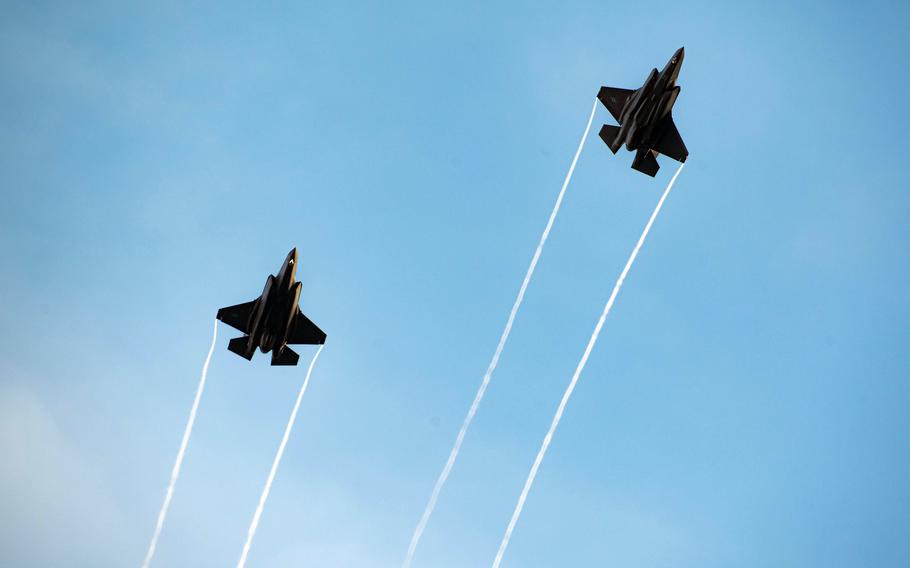
Two U.S. Air Force F-35A Lighting IIs assigned to the 493rd Fighter Squadron fly over RAF Lakenheath, England, in January 2024. U.S. Air Forces Europe and Africa isn’t ready for quick coordination against a cruise missile attack, according to a Rand Corp. report released Sept. 11. (Seleena Muhammad-Ali/U.S. Air Force)
The U.S. Air Force in Europe is not up to the split-second coordination of air and missile defense with allies, leaving Europeans in mortal danger in the event of an attack, according to a new report commissioned by the service.
Insufficient training, an inadequate command structure and failure to learn the right lessons from its many joint exercises mean U.S. Air Forces Europe and Africa isn’t ready for quick coordination against a cruise missile attack, the Rand Corp. think tank said this week.
Delays in information sharing “of even ten seconds can mean the difference between life and death,” Rand said in its report, released Wednesday. “In particular, USAFE is not organized to apply a satisfactory understanding of the information-sharing terrain to best advantage in planning and operations.”
Rand’s study on data-centric warfare was sponsored by USAFE-AF and offered numerous recommendations to improve how the command coordinates with allies in the early stages of a conflict.
“Incoming missiles are likely to overfly, be visible from, or be defended against using both U.S. and allied assets based in multiple allied sovereign territories,” Rand said.
For that reason, the Air Force must be in sync with allies ahead of any invocation of NATO’s Article 5 provision, which authorizes members of the bloc to join in collective defense if a fellow allied country is attacked.
Under such circumstances, air and missile defense would need to be coordinated by a coalition of the willing when it comes to sharing essential data, Rand said. Impediments to faster information sharing center on command culture and unclear policy, the report said.
USAFE-AF’s current information sharing agreements have been improved, but less progress has been made in linking the authorities needed to activate a multi-pronged defense prior ahead of an Article 5 declaration, the report said.
“Capability shortfalls (during that gap) could result in substantial territorial, personnel, or equipment losses that would increase the likelihood that an adversary would achieve its operational objectives,” according to researchers.
Even if information sharing practices were quickly adapted on the fly during a crisis for faster communication, it is unlikely to be quick enough without significant practice and training in advance, Rand said.
One coordination challenge facing the Air Force in Europe is high turnover in the command.
“Given the rotation of military and civilian personnel and the fluidity of coalitions, it is difficult to sustain the group skills needed for information-sharing at speed and scale in the European theater,” Rand said.
Since active-duty troops rotate with greater frequency, civilian personnel can pick up the slack to stabilize information sharing, according to the report.
But the Defense Department’s “five-year rule,” which limits how long its civilian employees can remain outside the continental United States, “is negatively affecting USAFE’s ability to sustain institutional knowledge,” Rand said, without specifically addressing possible workarounds.
Rand recommended that USAFE-AF develop new “data stewards and custodians” positions to aid in information sharing. It also should do wargames and simulations to rehearse how that process would play out ahead of a looming crisis, the report said.
In the longer term, USAFE-AF should be more vocal in advocating broader reforms, which make explicit who will have what authority at every phase of combat in general, Rand said.